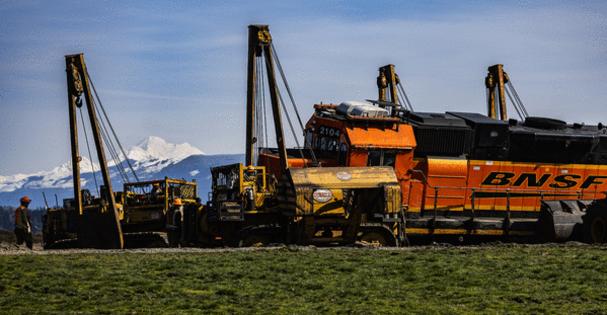Washington tribe settles lawsuit over oil-train trespass
Published in News & Features
SEATTLE — The Swinomish Indian Tribal Community said Tuesday it had reached an agreement with BNSF Railway, putting an end to a lawsuit over the railway's trespass over tribal land.
The terms of the agreement are confidential.
In June 2024 a Seattle judge ordered BNSF Railway to pay the Swinomish Indian Tribal Community nearly $400 million in profits from trespassing on the reservation. BNSF appealed.
The agreements reached with BNSF will create new opportunities for future Tribal investment in housing, health care and education for our Tribal members, and in natural resources stewardship," Swinomish Chair Steve Edwards said in a statement.
The tribe and BNSF participated in confidential mediation overseen by the 9th U.S. Circuit Court of Appeals and on Tuesday filed an update informing the court the mediation had resulted in a confidential resolution.
Swinomish and BNSF have agreed that one train carrying crude oil may be operated across the reservation each day. The tribe's consent to allow these trains to cross the reservation will decrease the volume of crude oil brought to be refined at March Point by tanker through the Salish Sea, according to the tribe.
This, according to the tribe, is anticipated to reduce the risk of potentially catastrophic marine vessel incidents, oil spills and harm to habitat. It is also expected to reduce interference with treaty fishing activities.
BNSF has agreed to address the tribe's concerns about the safety of the rail line and the swing bridge on the reservation.
“We look forward to working with the Tribe and further strengthening our new partnership,” said Katie Farmer, the president and CEO of BNSF. “We are excited for the future opportunity our partnership represents for the Tribe and our customers.”
In 2023, two train engines came off the tracks on Swinomish land, a few hundred feet from Swinomish Casino and Lodge. They leaked an estimated 3,100 gallons of diesel near the shore of Padilla Bay.
The derailment occurred when the lead locomotive struck a fixed derail device, forcing the train engines to topple on the south side of the tracks, just ahead of the swing bridge.
These measures ensure our culture and traditions endure long into the future while also supporting long-term economic viability. Everyone prospers when Tribal sovereignty is respected and industry works in true partnership with Tribes,” Edwards said in a statement.
The issue dates back to 1889, when BNSF’s predecessor illegally constructed railroad tracks through the Swinomish Reservation. The tribe objected, and court documents show the railway failed to obtain permission by treaty or an act of Congress before completing the railroad.
The tribe and BNSF reached an easement agreement in 1991, settling a lawsuit filed by the tribe and U.S. government for a century of trespass. The agreement permitted trains to carry no more than 25 cars each direction per day. It also required BNSF to tell the tribe about the “nature and identity of all cargo” crossing the easement, which is less than a mile long.
But in 2012, the tribe learned from news reports that “unit trains” of 100 rail cars or more were beginning to cross the reservation.
By 2015, BNSF was reportedly running six 100-car “unit trains” per week across the reservation, four times the number of cars permitted under the easement agreement. The tribe sued.
The trespass continued from 2012 to 2021 while BNSF ran 100-car trains hauling crude oil from the Bakken Formation in and around North Dakota through the reservation.
In 2023 U.S. District Judge Robert Lasnik ruled that BNSF willingly, consciously and knowingly trespassed when it ran about a quarter-million cars carrying crude oil over the reservation beyond what was outlined in the agreement with the tribe.
_____
(Material from The Seattle Times archives was included in this story.)
©2025 The Seattle Times. Visit seattletimes.com. Distributed by Tribune Content Agency, LLC.







Comments